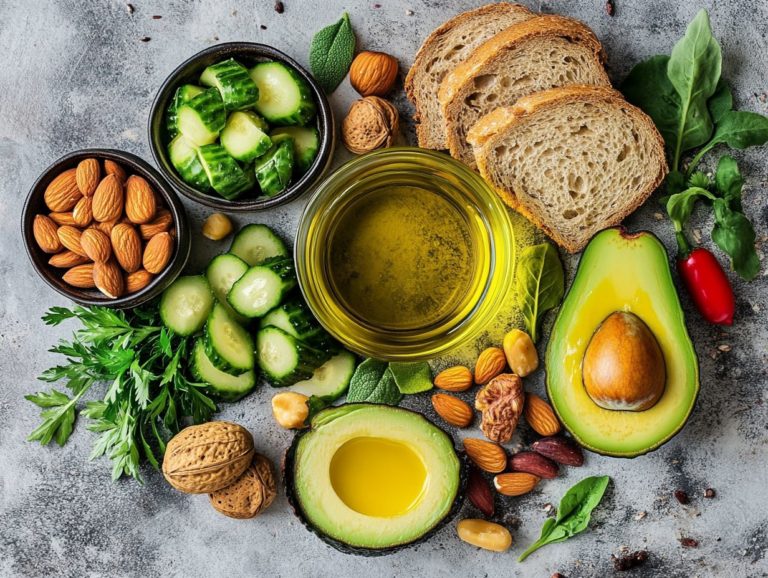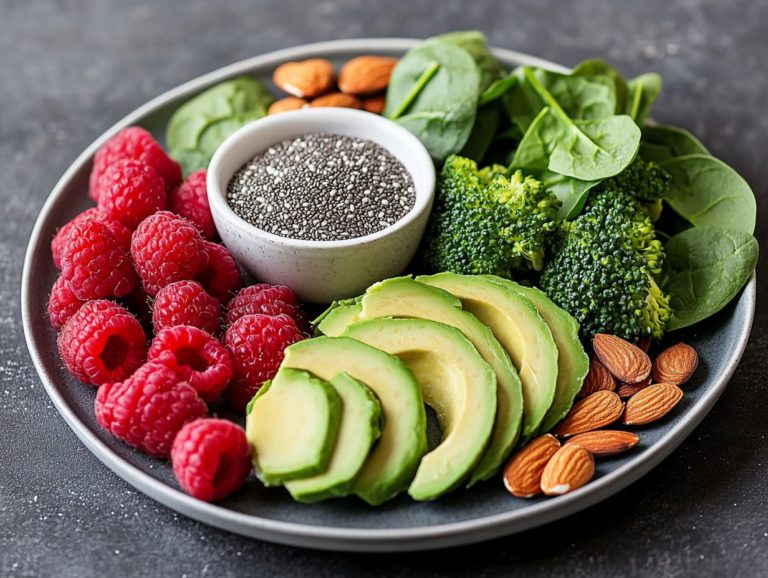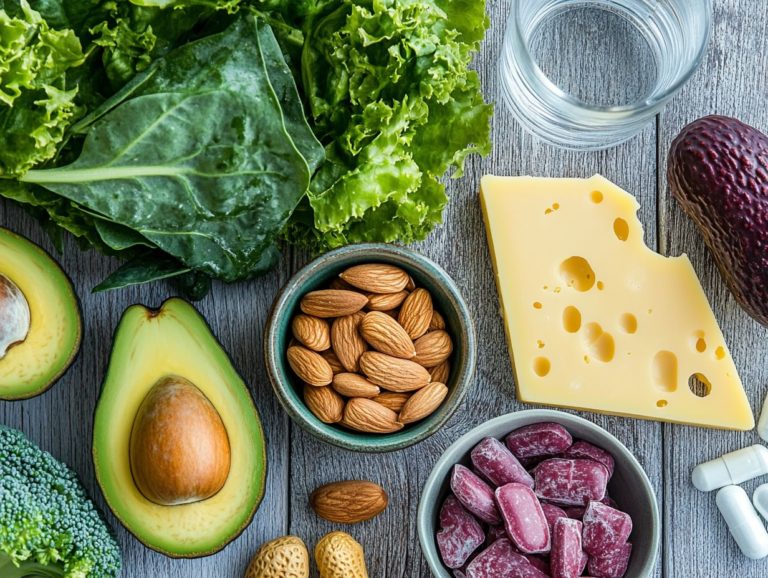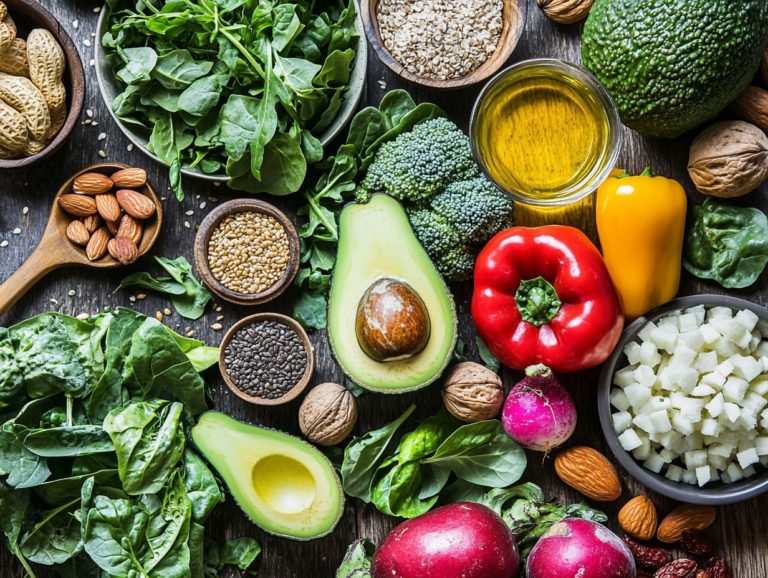Keto Diet: Nutritional Myths Debunked
The Keto Diet has surged in popularity, enticing many with its promises of weight loss and potential health benefits. However, grasping the fundamentals is essential for your success in navigating this high-fat diet.
Get ready to discover how the Keto Diet can transform your health and elevate your lifestyle with healthy meals!
This article delves into the very essence of the Keto Diet, covering its nutritional requirements, ideal macronutrient ratios, and the specific types of fats and proteins you should incorporate into your meals. It not only highlights the benefits but also debunks common keto myths surrounding the diet, offering practical tips to help you navigate this lifestyle effectively.
Contents
Key Takeaways:
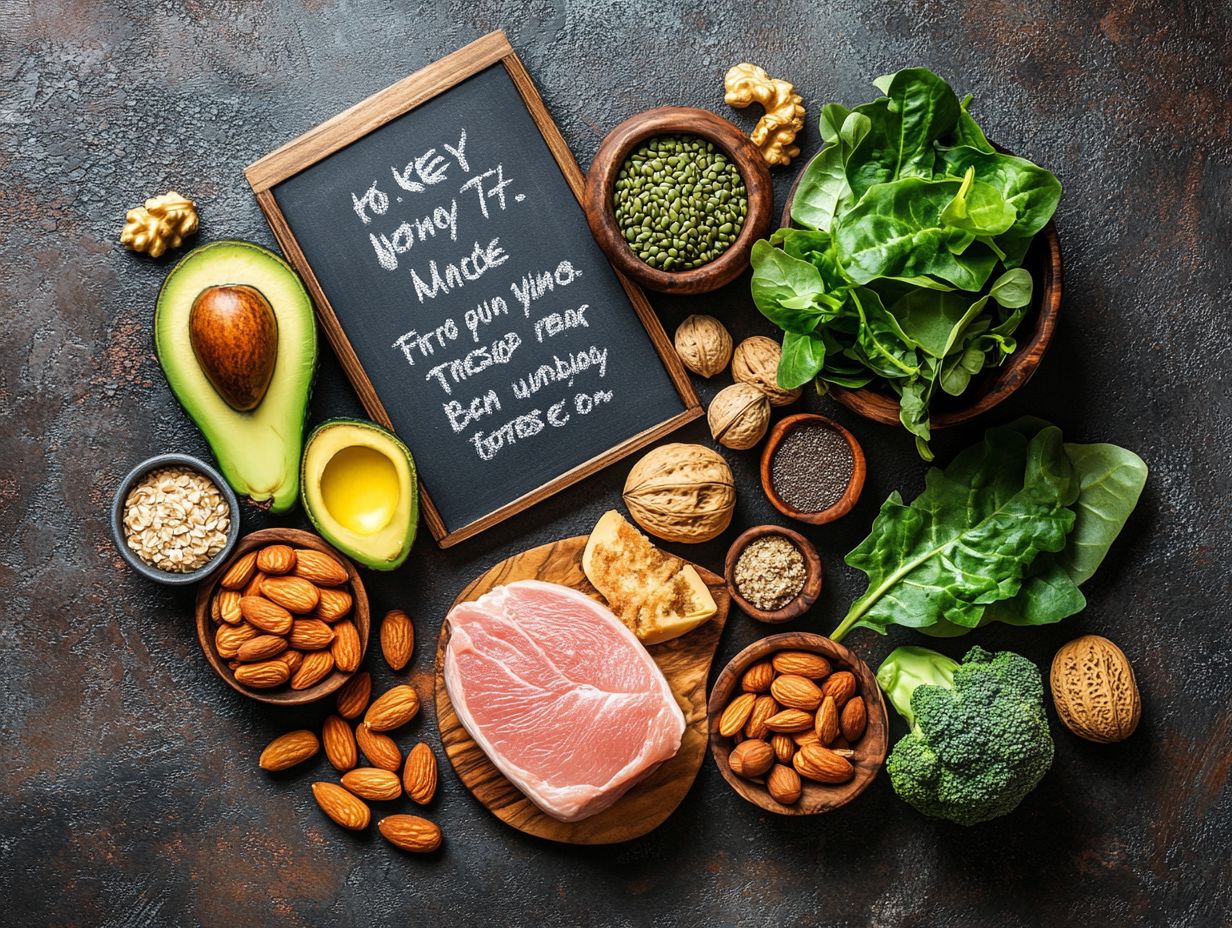
In this section, you will learn the main benefits of the Keto Diet that can help you in your journey:
- The keto diet can lead to weight loss, improved blood sugar control, increased energy, and reduced inflammation.
- The keto diet can be a healthy and sustainable way of eating. Consulting a ketogenic specialist or a nutritional therapist can provide additional guidance.
- To properly follow the keto diet, it is important to track macros, focus on nutrient-dense foods, stay hydrated, manage symptoms like keto flu, and listen to your body.
What is the Keto Diet?
The Keto Diet, or ketogenic diet, is a low-carb, high-fat regimen that has garnered significant attention for its ability to aid in weight loss by triggering a process where your body burns fat instead of carbs, known as ketosis. It’s often recommended by healthcare professionals like Edelle O Doherty and Kerry Torrens.
In this state, your body transitions its primary energy source from carbohydrates to fats, leading to the production of ketone bodies, which are fat byproducts that your body can use for energy. These compounds offer a variety of health benefits, including enhanced mental clarity and increased energy levels.
Designed for those looking for a sustainable approach to weight management, the Keto Diet focuses on incorporating healthy fats while effectively minimizing carbohydrate consumption. This approach is often combined with intermittent fasting and proper fat intake to maximize results.
What are the Nutritional Requirements of the Keto Diet?
To successfully embark on the Keto Diet, it s essential for you to grasp the nutritional requirements at play. This diet is built around a precise ratio of macronutrients aimed at promoting ketosis and facilitating weight loss, often under the guidance of a ketogenic specialist.
As a follower of the ketogenic diet, you will significantly cut back on carbohydrates, shifting your focus toward an increased intake of healthy fats while maintaining adequate protein levels. This balanced approach to dietary fat and caloric intake lays a solid foundation for effective weight management and bolsters your overall nutritional health.
Keeping track of your fat, protein, and carbohydrate intake is crucial.
How Many Carbs Should You Eat on the Keto Diet?
On the Keto Diet, managing your carbohydrate intake is absolutely crucial for achieving and maintaining ketosis. Typically, you ll want to limit your net carbs to about 20-50 grams each day, although this can vary based on your individual metabolism and energy needs.
By significantly cutting back on carbs, your body is compelled to turn to fat as its primary energy source, leading to the production of ketone bodies for fuel. This low-carb strategy supports weight loss and enhances both physical and mental performance.
Understanding the adjustment phase of ketosis adaptation can help you manage any initial challenges.
To truly optimize your results on the Keto Diet, monitoring your carbohydrate intake is essential. Understanding the distinction between net carbs and total carbs is key. Net carbs are calculated by subtracting fiber and specific sugar alcohols from the total carbohydrates, helping you stay within your carb limits.
Reading nutrition labels is vital to effectively tracking carbohydrate sources; it allows you to uncover hidden sugars that could hinder your progress. Engaging in meal planning with keto-friendly recipes, such as Keto breakfast recipes, Keto lunch recipes, and Keto dinner recipes, can simplify your journey, ensuring you enjoy a variety of satisfying, low-carb meals.
Keep in mind that carbohydrate tolerance differs from person to person, meaning what works wonders for one individual may not yield the same results for another.
Types of Fats in the Keto Diet
The types of fats you consume on the Keto Diet are essential for reaping health benefits and successfully maintaining ketosis. It’s crucial to focus on incorporating healthy fats while steering clear of trans fats.
You should prioritize saturated fats from sources like coconut oil, avocados, and grass-fed butter. Additionally, include unsaturated fats from olive oil, nuts, and fatty fish. These fats play a vital role in providing energy and supporting your overall health while adhering to ketogenic principles.
Healthy snacks like nuts and seeds help you stay on track. Each category of fat has distinct effects on your body, influencing everything from heart health to inflammation and hormonal balance.
Healthy fats, such as medium-chain triglycerides (MCTs) found in coconut oil, offer quick energy for those embracing the ketogenic lifestyle. Meanwhile, omega-3 fatty acids from fatty fish like salmon are celebrated for their powerful anti-inflammatory properties. Including these fats can also enhance your exercise performance.
Conversely, it’s important to strictly avoid unhealthy trans fats, often lurking in processed foods due to their harmful effects on heart health. For those passionate about keto, delicious recipes like creamy avocado salads or cauliflower smoothie bowls can showcase these delicious and beneficial fats in exciting ways, proving that maintaining ketosis can be both tasty and nutritious while promoting overall wellness.
Experimenting with healthy snacks and keto-friendly recipes can make the diet more enjoyable.
Protein Intake on the Keto Diet
On the Keto Diet, it’s wise to moderate your protein intake, typically aiming for about 20-25% of your total caloric intake. Excessive protein can lead to a process where the body converts protein into glucose, which may hinder your journey into ketosis.
Consulting a nutritional therapist can help tailor your protein consumption according to your needs. Focus on sourcing high-quality protein from keto-friendly foods like meat, fish, eggs, and dairy.
These not only help preserve muscle during weight loss but also supply essential nutrients vital for your overall health. Exploring various keto protein sources can help diversify your meals.
Understanding protein’s role in your low-carb lifestyle is crucial for success. It influences not only your muscle maintenance but also your feelings of fullness, which can help you manage cravings and prevent overeating.
If you’re following the ketogenic approach, calculating your individual protein needs usually depends on factors such as your weight, activity level, and specific goals. A general recommendation is to aim for around 0.6 to 1 gram of protein per pound of lean body mass.
Consulting with a ketogenic specialist can help customize these recommendations. To elevate your meal planning, consider incorporating a diverse array of high-protein foods, such as fatty cuts of meat, oily fish, and low-carb dairy options.
This variety keeps your dishes satisfying while remaining aligned with keto principles. Including keto-friendly products like Ancient Nutrition’s Keto Fire can also support your dietary goals.
Additionally, meal prepping can be a game-changer, allowing you to maintain your macronutrient balance with ease.
What are the Benefits of the Keto Diet?
The Keto Diet presents a wealth of benefits that go far beyond mere weight loss, establishing itself as a favored option for individuals aspiring to enhance their overall health and well-being. Collaborating with a healthcare professional can provide additional insights into maximizing these benefits.
Research demonstrates that embracing a ketogenic lifestyle can lead to improved blood sugar control, heightened energy levels, sharper mental clarity, and reduced inflammation each contributing to a healthier metabolic state. Johns Hopkins Medical Center has conducted extensive studies on these benefits.
When you combine these advantages with the diet s emphasis on high-fat, low-carb foods, it creates a sustainable framework tailored for anyone looking to optimize their nutritional health.
Benefits of the Keto Diet
1. Weight Loss Benefits
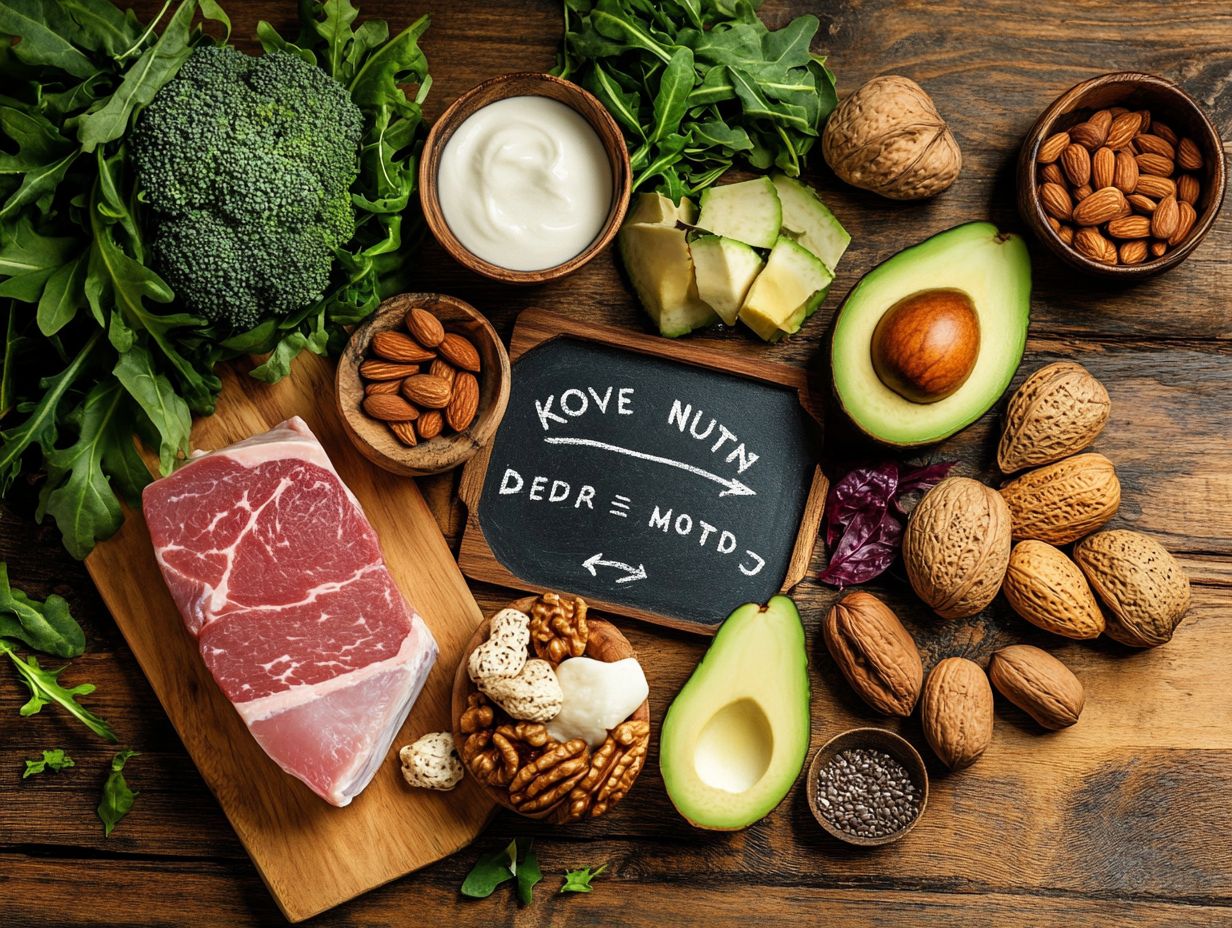
Weight loss is often the primary motivation for individuals like you to embrace the Keto Diet. By reducing carbohydrate intake, you create a caloric deficit that encourages your body to burn stored fat for energy.
In the initial weeks, many experience a swift loss of water weight due to the diuretic effect of ketosis. Following that, a gradual decrease in body fat can be motivating for anyone seeking effective weight management solutions.
Understanding the role of protein intake and dietary fat can further enhance your success. The transformation you undergo relies on key mechanisms, primarily a decrease in insulin levels coupled with an increase in fat oxidation. This combination empowers your body to effectively utilize its fat reserves.
To truly maximize your weight loss success on keto, it s crucial to understand the details of portion sizes and maintain awareness of your caloric intake. Even keto-approved foods can tip the scales if indulged in excessively. Incorporating regular physical activity can amplify your fat-burning efforts.
Countless inspiring success stories await you, showcasing remarkable changes in health and vitality. These narratives reinforce the potential of the Keto Diet when approached with thoughtfulness and consistency. Trying out varied keto-friendly recipes such as Keto snack recipes or Keto dinner recipes can add diversity to your meals.
2. Improved Blood Sugar Control
Improved blood sugar control is one of the standout benefits of the Keto Diet. By cutting back on carbohydrates, you will notice lower blood glucose levels and enhanced insulin sensitivity, making it an excellent option if you are managing diabetes or prediabetes.
Stabilizing your blood sugar not only helps reduce the chances of developing type 2 diabetes but also promotes overall metabolic health, allowing you to potentially lessen your reliance on medications. Including vegetable intake can also support blood sugar management.
Numerous clinical studies back this up, showing that individuals following a ketogenic lifestyle or a low-carb diet often experience significant improvements in their fasting glucose readings and overall glycemic management. Experts such as Edelle O Doherty suggest that during the initial adjustment phase, it is crucial for you to monitor your blood sugar levels closely as your body transitions into ketosis for better symptoms management.
You will find many inspiring success stories of people who have made this dietary shift; individuals who once depended on diabetes medications now report being able to significantly reduce or even eliminate their prescriptions, crediting their success to a consistent low-carbohydrate, high-fat regimen.
These transformative journeys underscore the Keto Diet as a promising strategy for diabetes management, offering renewed hope to those who wish to regain control over their health. Transform your health today with the Keto Diet. Discover how people have changed their lives by embracing this approach.
3. Increased Energy and Mental Clarity
One of the most celebrated benefits of the Keto Diet is the surge in energy and mental clarity that you may experience, thanks to your body adapting to using ketone bodies, energy produced from fat, as its primary energy source instead of glucose. This change not only boosts your physical performance during activities but also sharpens your cognitive functions, enhancing your focus, concentration, and overall mental agility.
According to experts like Kerry Torrens, this shift can have profound effects on your overall well-being. The way your body metabolizes fat to produce ketone bodies stands in stark contrast to carbohydrate metabolism, where glucose takes the lead. Unlike glucose, which can cause those frustrating spikes and crashes in energy levels, ketone bodies offer a more stable and enduring source of energy.
Research supports the idea that individuals following a ketogenic lifestyle often report heightened alertness and a significant reduction in brain fog. Many testimonials indicate that those who embrace this diet experience a consistent increase in energy throughout their day. Strategies such as staying hydrated and incorporating moderate exercise are frequently suggested to help sustain this vitality.
By optimizing your diet to ensure you re getting enough healthy fats, you can further enhance your cognitive performance and overall sense of well-being.
4. Reduced Inflammation
The Keto Diet is known for its ability to reduce inflammation, providing welcome relief for those dealing with inflammatory conditions and chronic diseases. By cutting back on carbohydrates and emphasizing healthy fats, you can effectively lower oxidative stress and inflammatory markers in your body, paving the way for a healthier metabolic state and improved overall well-being.
Recent studies reveal that embracing a ketogenic lifestyle may substantially decrease levels of C-reactive protein (CRP), a marker of inflammation, and interleukin-6 (IL-6), both of which are vital indicators of inflammation. Start your journey with the Keto Diet today! Focus on incorporating nutrient-dense foods like avocados, nuts, and fatty fish while steering clear of processed carbohydrates and sugars.
Over time, you’ll likely see that not only do your inflammation levels drop, but you also enjoy enhanced cognitive function, improved energy levels, and even better weight management. By prioritizing a well-rounded approach to the Keto Diet, you can unlock these long-term health benefits and truly transform your well-being.
What are the Common Myths about the Keto Diet?
Despite its rising popularity, the Keto Diet is often shrouded in misconceptions and myths that can lead to confusion and skepticism among those considering it. You might encounter beliefs suggesting that the Keto Diet is inherently unhealthy or overly complicated, which can dissuade you from exploring its potential benefits.
By addressing these myths with accurate information from nutritional therapists and healthcare professionals, you empower yourself to make well-informed dietary choices that align with your health goals. Experts from Ancient Nutrition and products like Keto Fire can also provide valuable insights and support.
Explore more about how the Keto Diet can transform your life!
Myth 1: The Keto Diet is Unhealthy
One common myth you might encounter is the belief that the Keto Diet is unhealthy, primarily due to its focus on saturated fat and the potential exclusion of certain food groups. This misconception often leads many to assume it could be harmful to heart health and overall wellness.
However, research reveals that when you balance the ketogenic diet with healthy fats and nutrient-dense foods, it can actually support cardiovascular health and provide essential nutrients. Comparing keto with the paleo diet can also offer perspectives on the best approach for healthy weight management.
For instance, experts suggest that you prioritize unsaturated fats, such as those found in avocados, nuts, and olive oil. Incorporating these into your ketogenic plan can significantly improve your heart health. Studies also emphasize the importance of a well-rounded approach that integrates various food sources, highlighting that whole foods rich in vitamins and minerals should never be overlooked.
Notably, a review published in ‘Nutrition Reviews’ indicates that the keto diet can effectively reduce risk factors for heart disease when implemented correctly. This evidence reinforces the significance of proper dieting practices, illustrating that with the right balance, the keto diet can be not only safe but also beneficial for individuals like you who are seeking to enhance their health.
Myth 2: The Keto Diet is Difficult to Follow
Another common misconception is that the Keto Diet is a Herculean task, plagued by strict carbohydrate limits and the necessity for meticulous meal planning. Although it may require a bit of adjustment at first, you’ll discover that with the right resources think keto-friendly recipes and effective meal planning strategies sticking to the diet can transform from a daunting challenge into an enjoyable experience.
For those embarking on the keto journey, crafting a weekly meal plan can be a true game changer. By setting aside just a few hours each week to plan your meals and snacks, you can sidestep the overwhelming decision fatigue that often accompanies busy weekdays.
Leveraging apps or websites that provide tailored grocery lists for keto can simplify your shopping experience, making it much easier to adhere to your plan. You ll find that success stories from individuals who have embraced this high-fat, low-carb lifestyle frequently underscore the importance of community groups and forums, where shared tips and encouragement abound. Additionally, exploring Keto breakfast recipes, Keto snack recipes, Keto lunch recipes, and Keto dinner recipes can make your journey more enjoyable.
Additionally, preparing meals in bulk not only saves you precious time but guarantees that you have delicious and satisfying keto options readily available, allowing for a seamless integration into your daily routine.
Myth 3: The Keto Diet is Only for Weight Loss
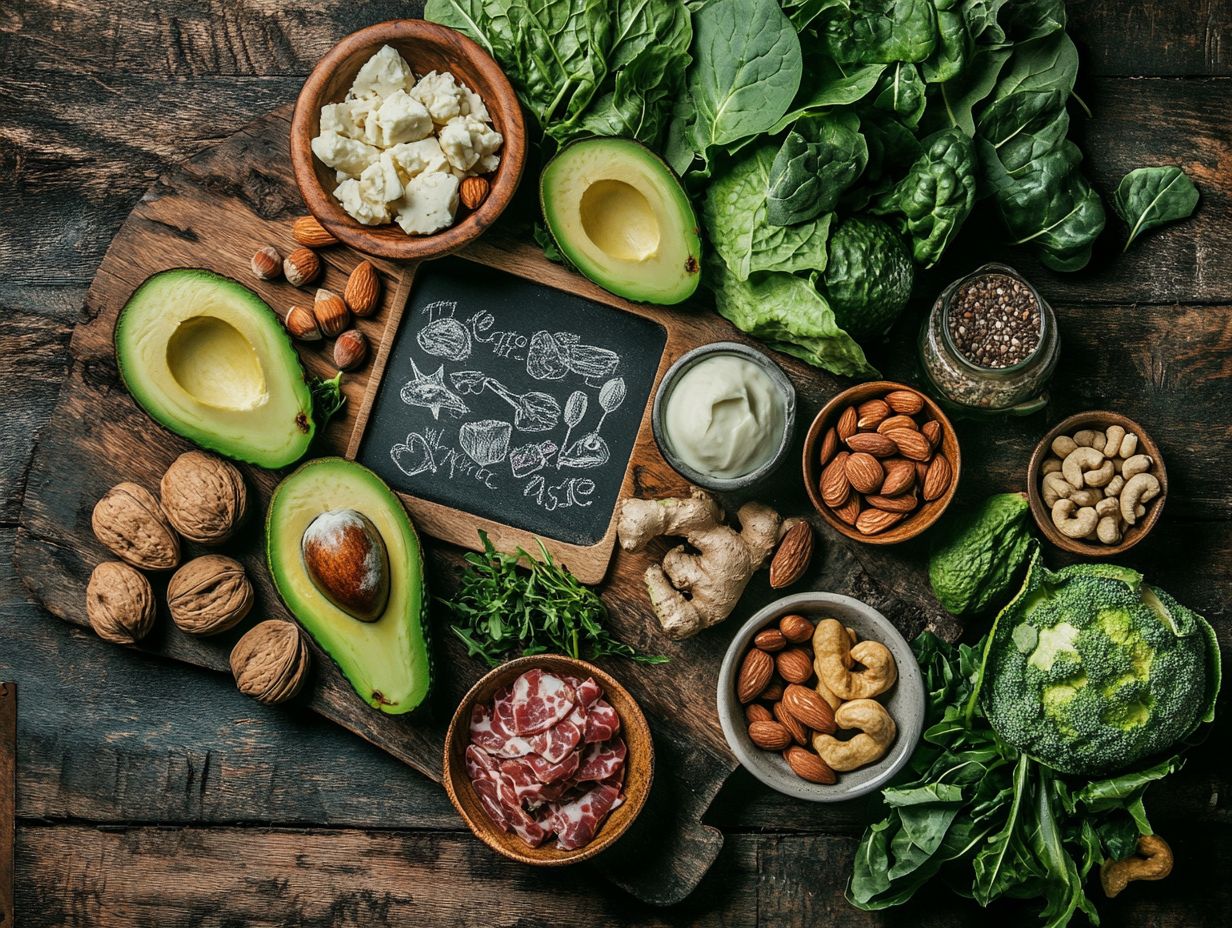
It s a common misconception that the Keto Diet is solely about shedding those extra pounds, but it offers a wealth of health benefits that often go unnoticed. You might be surprised to learn that it can improve blood sugar control, boost energy levels, and reduce inflammation.
While weight loss is certainly a notable outcome for many, the keto diet is equally capable of promoting overall health and well-being, even for those who are not looking to lose weight.
For instance, research from institutions like Johns Hopkins Medical Center suggests that this dietary approach can enhance cognitive function and potentially provide protection against neurological diseases, making it a compelling option for anyone concerned about brain health. Additionally, some case studies have shown that the ketogenic diet can lead to significant reductions in markers of inflammation and oxidative stress factors closely related to chronic diseases.
By embracing the keto lifestyle, you may not only enjoy these physical benefits but also find an improvement in mental clarity and focus as your body shifts into fat-burning mode. Ultimately, the ketogenic diet should be seen as a sustainable lifestyle choice that can support a range of health objectives beyond mere weight loss.
Myth 4: The Keto Diet Causes Nutrient Deficiencies
A common concern you might encounter with the Keto Diet is its potential to lead to nutrient deficiencies, given its restrictive nature. This can leave you missing out on essential vitamins and minerals.
However, with careful planning and guidance from healthcare professionals and nutritional therapists, you can absolutely maintain a well-rounded, nutrient-dense diet while embracing a ketogenic lifestyle.
To strike this balance, it s vital for you to incorporate a diverse array of low-carb vegetables, high-quality meats, and healthy fats like avocados and olive oil. Exploring alternative nutrient sources, such as nuts and seeds, will also enhance the variety in your diet.
By thoughtfully integrating foods like leafy greens, cruciferous vegetables, and berries in moderation, you can ensure that all your nutritional needs are met. Incorporating organic superfoods can further support your health on this dietary journey.
Consulting with healthcare providers will allow you to tailor the diet to your individual needs, creating a sustainable approach that supports your long-term wellness without sacrificing essential nutrient intake.
How to Follow the Keto Diet Effectively?
Successfully navigating the Keto Diet demands more than just cutting back on carbohydrates; it calls for a comprehensive strategy that encompasses:
- Tracking your macros
- Prioritizing whole, nutrient-dense foods
- Maintaining proper hydration
- Tuning in to your body s signals
By adopting these practices, you can enhance your ketogenic journey and attain lasting results through effective weight management. For more insights, you might consider resources from experts such as Edelle O Doherty and Kerry Torrens.
1. Track Your Macros
Tracking your macros is an essential part of the Keto Diet. This practice allows you to monitor the balance of carbs, fats, and proteins and ensure you meet your caloric intake goals to effectively enter ketosis.
By using apps or keeping a food diary, you can easily track your carbohydrate, protein, and fat intake, aligning with the specific guidelines of the ketogenic diet and making informed choices about carb sources.
These strategies not only help you maintain the recommended macronutrient ratios but also empower you to make informed dietary choices. Digital tools provide convenience and real-time insights into your eating habits.
Meanwhile, traditional journaling fosters a deeper awareness of your food relationships and patterns. For expert guidance, the insights from Johns Hopkins Medical Center can be invaluable.
Regardless of the method you choose, it s crucial to adjust your macronutrient intake based on your personal preferences and lifestyle. For instance, if you re particularly active, you might require a slightly higher protein intake, whereas those who are less active may opt to focus more on fats.
Regularly reassessing your goals and making adjustments can enhance your ketogenic journey, making it both effective and enjoyable. Try different Keto breakfast recipes, lunch recipes, dinner recipes, and snack recipes to add variety to your meals.
2. Focus on Whole, Nutrient-Dense Foods
Focusing on whole, nutrient-dense foods is essential for reaping the health benefits of the Keto Diet. These foods provide the vital vitamins, minerals, and antioxidants that support your overall well-being while helping you maintain ketosis.
By incorporating a diverse array of fresh, whole ingredients into your meals, you ensure balanced nutrition and pave the way for delicious Keto meals that satisfy both your cravings and dietary objectives.
Prioritizing vibrant vegetables, high-quality proteins, and healthy fats can significantly enhance the effectiveness of your diet. For example, leafy greens like spinach and kale not only boost your nutrient intake but also add a satisfying crunch to salads or smoothies.
Incorporating grass-fed meats, wild-caught fish, and eggs offers the necessary protein for muscle preservation and energy. Healthy fats from sources such as avocados, olive oil, and nuts are crucial for satiety and flavor.
Try exciting meal ideas like a zesty cauliflower rice stir-fry with shrimp or a creamy avocado and spinach smoothie to kick-start your day. To keep snacking interesting, consider options like homemade cheese crisps or crunchy celery sticks with almond butter.
Embracing variety will help maintain your motivation and keep boredom at bay.
3. Stay Hydrated
Staying hydrated is essential on the Keto Diet, especially during the initial adjustment phase often called the ‘keto flu.’ During this time, you might feel tired or have headaches, largely due to dehydration and electrolyte imbalances. By prioritizing proper hydration through sufficient water intake and electrolyte supplementation, you can ease your transition into ketosis and minimize discomfort.
Drinking water alone may not be enough during this phase, as your body tends to flush out excess water and electrolytes when you reduce carbohydrate intake. To tackle this, consider incorporating bone broth into your routine; it s not only delicious but also an effective way to replenish sodium, potassium, and magnesium levels. Products like Keto Fire from Ancient Nutrition can also be beneficial. Including low-carb, electrolyte-rich foods like avocado, spinach, and nuts will further support your balance, ensuring you remain hydrated and energized.
Make it a fun routine to sip water throughout your day, particularly during workouts or in hot weather. This practice is vital for maintaining optimal hydration levels and preventing discomfort often associated with this dietary shift.
4. Listen to Your Body
Listening to your body is crucial when navigating the Keto Diet, as individual experiences and needs can vary widely, influencing how you manage symptoms and perform during exercise. By paying attention to your hunger cues, energy levels, and overall well-being, you can make informed adjustments to your diet and lifestyle, optimizing your ketogenic journey.
Being mindful of your physical sensations can significantly enhance the benefits of the diet. For example, if you notice fatigue after consuming certain foods, it may be a sign to reevaluate those choices. Recognizing warning signs such as cravings, mood swings, or digestive issues can provide valuable feedback on what works for you. Keeping a food journal can be a practical tool to track these patterns and identify any troublesome items.
Adapting your meals to fit your personal preferences not only helps you stick to the plan but also makes the experience more enjoyable. Ultimately, by understanding these signals, you ll cultivate a balanced approach that fosters a more beneficial and personalized ketogenic lifestyle.
Frequently Asked Questions
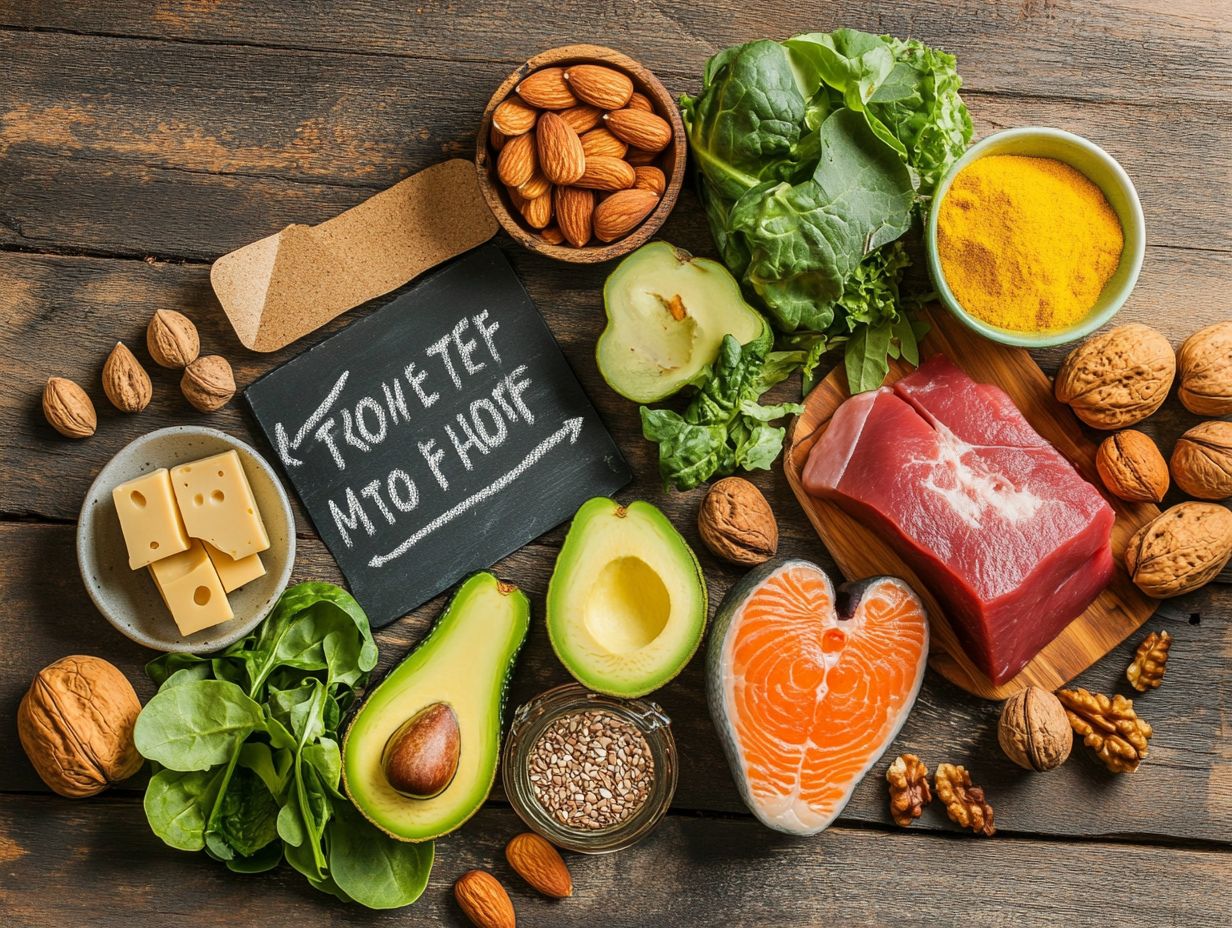
What is the Keto Diet?
The Keto diet is a high-fat, moderate-protein, and low-carbohydrate diet that aims to put your body in a state of ketosis, where it burns fat for energy instead of carbohydrates.
Is the Keto Diet Safe?
The Keto diet is generally considered safe for most healthy individuals. However, it may not be suitable for those with certain medical conditions, such as kidney disease or type 1 diabetes. It is always best to consult with a healthcare professional before starting any new diet.
Is the Keto Diet Just a Fad?
While the Keto diet has gained popularity in recent years, it has been used for medical purposes since the 1920s to treat epilepsy. Numerous studies have also shown its effectiveness in weight loss and improving overall health.
Do I Have to Completely Eliminate Carbs from My Diet on Keto?
The Keto diet does require a significant reduction in carbs, typically below 50 grams per day. However, it is not necessary to eliminate them entirely. Eating healthy, complex carbs in moderation, such as leafy greens and low-sugar fruits, can still be a part of a Keto diet.
Will I Feel Tired and Weak on the Keto Diet?
During the first few weeks of transitioning to the Keto diet, some people may experience what is known as the “Keto flu,” which can cause fatigue and weakness. However, you will typically see these symptoms subside as your body adjusts to burning fat for energy.
Can I Still Exercise on the Keto Diet?
Absolutely! Exercise is an essential part of a healthy lifestyle, and it can still be incorporated into a Keto diet. Just be sure to listen to your body and adjust your workouts as needed to accommodate the lower carb intake.
Start your Keto journey today for a healthier you!


